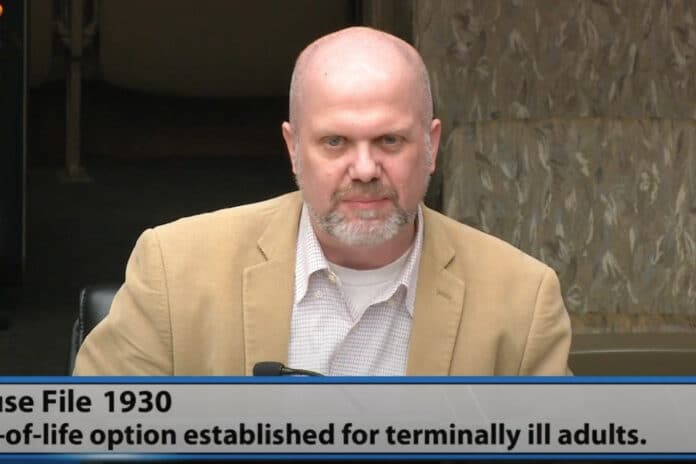
A bill that would make Minnesota the 11th state in the nation to legalize physician-assisted suicide cleared its second committee in the state House on Thursday.
Rep. Mike Freiberg, DFL-Golden Valley, has been carrying the bill in the legislature for nearly a decade. And he’s participated in a number of symposiums and conferences on the topic of “medical aid in dying” for terminally-ill patients.
Thursday’s party-line vote in the House Public Safety Committee to approve the bill and refer it to its next committee stop represents the farthest Freiberg has been able to move the legislation.
“It’s not an easy issue to talk about,” Freiberg said at the conclusion of nearly an hour of public testimony and debate among legislators over the public safety components of the bill, such as what constitutes coercion and whether the language should require witnesses when a terminally-ill patient self-administers a lethal prescription pill to end their life.
“If I ever get to a point where I have to make this sort of decision, I know I would feel an option out there like this for me,” Freiberg said. “I have heard so many stories from Minnesotans who feel the same way. We have people who are here who are in the stage of terminal disease.”
Rep. John Huot, DFL-Rosemount, an emergency medical technician, didn’t cast a vote initially during a roll call on the bill. But after the vote tally was 7 in favor and 6 opposed, Huot voted ‘yes.’ It now moves to the House Judiciary Finance and Civil Law Committee.
The bill was first heard in the House Health Finance and Policy Committee in January, two weeks before the legislative session began.
Since then dozens of written testimonies have been sent to legislators and the committees hearing the bill. Among several letters submitted to the House Public Safety Committee, a number were from medical doctors, physicians assistants, psychiatrists and registered nurses who opposed the bill. Written testimonies opposing the legislation also came from teenage Minnesotans and organizations like Autistic Self Advocacy Network. Other medical professionals wrote the committee asking for legislators to support the bill.
The legislation’s effective date is Aug. 1, 2024. A companion bill in the Senate has not yet received a hearing. Democrats hold a 34-33 seat advantage in the upper chamber, but one DFLer, Sen. John Hoffman of Champlin, has voiced strong public opposition to the bill, which means it would need Republican support. Democratic Senate Majority Leader Erin Murphy, DFL-St. Paul, indicated during a press conference last month that she does not believe the bill will pass this year.
Gov. Tim Walz has expressed support for the bill but hasn’t said whether he would sign it if it passes both chambers.
Republicans who opposed the bill in the House Public Safety Committee on Thursday expressed skepticism that the bill’s lack of requirement for someone to witness the patient self-administer the lethal medication won’t be abused.
Rep. Elliott Engen, R-White Bear Township, pressed Freiberg to answer whether the legislation would require a witness to be present or whether there generally happens to be others present when a person self-administers the prescribed medication.
“Almost all of the patients who have gone through this in Oregon are also in hospice,” Freiberg pointed out, as his legislation is similar in scope to Oregon’s medical aid in dying statute.
Rep. Brion Curran, DFL-Vadnais Heights, said: “I am just constantly being asked to please pass this” legislation.
“In order for us to have full dignity we have to have choices,” Curran said. “We can’t just control people’s options for our own level of comfort … There is a multitude of ways that people leave this world and I think there is dignity in all of those ways.”
Rep. Matt Grossell, R-Clearbrook, is concerned the legislation will take Minnesota down a slippery slope.
“So when we open the Pandora’s box and allow something like this to come in, I think we all have to be very, very cautious and mindful how much we are going down a path of darkness to destruction when we open this box and let this thing out,” Grossell said.
Hank Long
Hank Long is a journalism and communications professional whose writing career includes coverage of the Minnesota legislature, city and county governments and the commercial real estate industry. Hank received his undergraduate degree at the University of Minnesota, where he studied journalism, and his law degree at the University of St. Thomas. The Minnesota native lives in the Twin Cities with his wife and four children. His dream is to be around when the Vikings win the Super Bowl.











